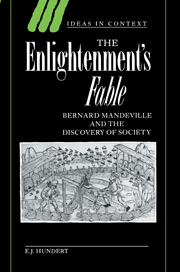Book contents
Epilogue
The Fable's modern fate
Published online by Cambridge University Press: 23 November 2009
Summary
In 1833, upon attaining his majority, Robert Browning's father presented his son with a copy of the 1795 edition of The Fable of the Bees. The younger Browning seems to have read at least part of Mandeville's work, but showed no evidence of this until 1887, when he published “With Bernard De Mandeville,” a poem of 321 iambic pentameter lines in 11 sections, in a book of poems on persons eminent in their day. (A contemporary remarked that many of these people were “names to be reached for in a biographical dictionary.”) When Browning returned to The Fable at the age of seventy-five, he concentrated almost entirely on “The Vindication of the Book,” paraphrasing some of Mandeville's sentences as he wrote. He aims in the poem to answer what he understood to be the pessimism of Carlyle, who offended the poet's unwavering belief that God used evil to produce virtue in men's souls. Mandeville, Browning thought, knew long ago what Carlyle was unable to see, that
as with body so deals law with soul
That's stung to strength through weakness, strives for good
Through evil — earth its race-ground, heaven its goal.
One of Mandeville's few readers who completely failed to grasp any feature of his satire, Browning read The Fable as a theodicy.
- Type
- Chapter
- Information
- The Enlightenment's FableBernard Mandeville and the Discovery of Society, pp. 237 - 249Publisher: Cambridge University PressPrint publication year: 1994



